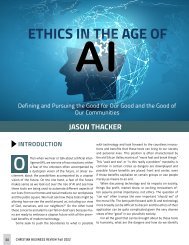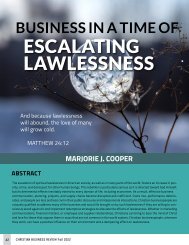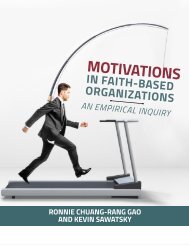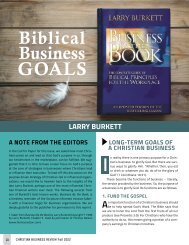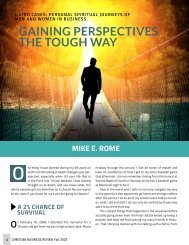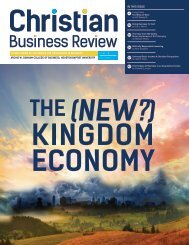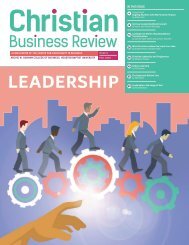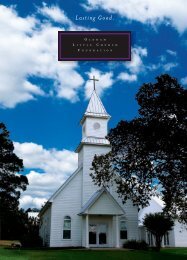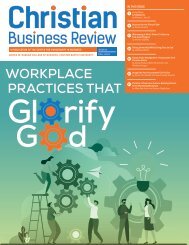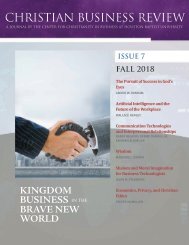Christian Business Review 2022: Pressing On Toward God's Goal
Create successful ePaper yourself
Turn your PDF publications into a flip-book with our unique Google optimized e-Paper software.
BUSINESS IN A TIME OF LAWLESSNESS<br />
CBR PEER REVIEWED ARTICLES<br />
We have ample evidence that a mindset of lawlessness<br />
is increasingly manifest even within the <strong>Christian</strong> community.<br />
A LifeWay Research study found only 45 percent of those<br />
who regularly attend church read the Bible more than once<br />
a week, and almost 20 percent of these churchgoers admit<br />
they never read the Bible. 13 If one is not familiar with the<br />
word of God, one can hardly be expected to obey it, and biblical<br />
illiteracy hampers the exercise of discernment and godly<br />
skill for living, again leaving the door open for the intrusion<br />
of lawless thinking.<br />
SOME PERVASIVE<br />
CHARACTERISTICS OF<br />
LAWLESSNESS<br />
LAWLESSNESS MEANS NO FEAR OF<br />
GOD<br />
<strong>On</strong>e defining characteristic of lawlessness is a lack of healthy<br />
fear of God. Although to “fear” in the Old Testament can simply<br />
mean a visceral fright that is unconnected to true faith,<br />
these instances number fewer than a dozen, and some of<br />
those are disputed. However, according to Albert N. Martin,<br />
there are between 150 to 175 explicit references to the fear<br />
of God in the Old Testament. Coupled with instances in which<br />
the fear of God is illustrated, though not explicitly stated,<br />
these examples can be counted in the hundreds. 14 In each<br />
case the idea is one of faith and obedience toward God, as,<br />
for example, in the case of the Israelite midwives in Egypt<br />
(Exod 1:17, 20) or when Nehemiah promotes Hananiah (Neh<br />
7:2), because he demonstrated fear of God. Similar usage can<br />
be found in the Second Temple literature and in the New Testament<br />
up to and including Acts 13. 15 Thus, Scripture gives<br />
unequivocal testimony that a spiritually healthy person and<br />
society will exhibit the fear of God by adhering to his commands<br />
and respecting his moral authority to govern all human<br />
institutions.<br />
The fear of God is the opposite of each person doing what<br />
is right in her own eyes. Instead of being accountable to no<br />
one, people who fear God recognize their accountability to<br />
the transcendent judge, whose rule is both authoritative and<br />
essential for human well-being. The fear of God thus constrains<br />
behavior and, at a minimum, causes people to curb<br />
their worst impulses, deeming it foolhardy to run afoul of the<br />
Judge of the universe and suffer the consequences he dispenses.<br />
In practice, then, the fear of God reflects an understanding<br />
of Paul’s warning in Gal 6:7, “Do not be deceived,<br />
God is not mocked; for whatever a [person] sows, this [he<br />
or she] will also reap.” Rather than reap the consequences,<br />
those who fear God will often (but not always) choose to<br />
adhere to his moral standards and norms, even when under<br />
pressure to do otherwise.<br />
By coupling lawlessness with impurity (or uncleanness) in<br />
Rom 6:19 16 , the Apostle Paul verifies the linkage between a<br />
state of individual sin and widespread moral corruption. He<br />
also portrays the repetitive choice to be a slave to impurity<br />
and lawlessness as a recipe for an escalating downward spiral<br />
in terms of more and more lawlessness. That uncleanness<br />
is associated with lawlessness shows that moral impurity<br />
has consequences beyond the corruption of the individual<br />
alone. Rather, moral impurity is associated with the lawlessness<br />
that tears away at the fabric of society, ripping apart<br />
God’s established institutions and provisions for human<br />
flourishing. Impurity or uncleanness and lawlessness are<br />
contrasted by Paul in Rom 6:19 with righteousness leading<br />
to sanctification, which is the desired end-state of Christ’s<br />
work in believers.<br />
Therefore, in view of these very real pitfalls, <strong>Christian</strong><br />
businesspeople do well to cultivate honest messaging to<br />
consumers, honoring their promises as well as ensuring good<br />
value in the products they produce and market. If <strong>Christian</strong>s<br />
in the business community mislead their customers and<br />
suppliers and cannot be trusted, they have bowed to cultural<br />
lawlessness, because research shows that trust and cooperative<br />
behavior is essential for business relationships to<br />
prosper. 17<br />
LAWLESSNESS RESULTS IN CHAOS<br />
A general axiom is that God is not a god of confusion and<br />
chaos (1Cor 14:33). Wherever we find genuine fear of God<br />
and respect for God’s rule, we also find God’s people at work<br />
restoring peace and order. Lawlessness foments chaos,<br />
darkness, and hopelessness. From an economic perspective<br />
its presence also thwarts order, stability, and efficient<br />
production processes as well as reliable delivery and scheduling.<br />
Many of the current disruptions in supply chains are<br />
the result of chaos, bottlenecks, and lawless disruptions. 18<br />
<strong>Business</strong>es cannot thrive under conditions of chaos; in<br />
fact, virtually no human enterprise thrives in the presence<br />
of lawlessness and its accompanying disruptions in order,<br />
productivity, and logistics. The <strong>Christian</strong>’s redemptive role in<br />
CHRISTIAN BUSINESS REVIEW Fall <strong>2022</strong> 452




